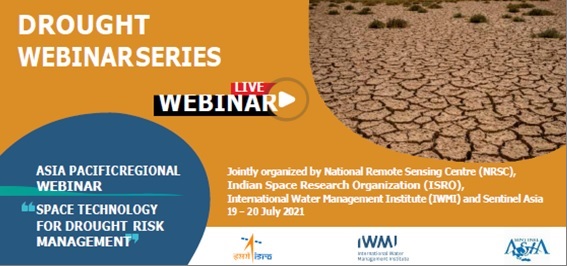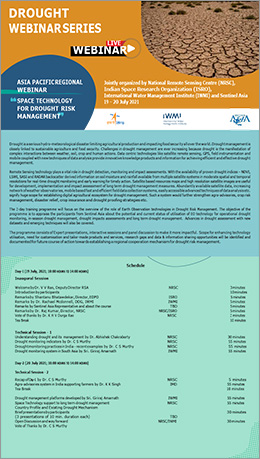"Space Technology for Drought Risk Management" co-organized by ISRO and IWMI
The first Sentinel Asia Webinar titled "Space Technology for Drought Risk Management" was held in July 2021. 50 experts and practitioners from the Sentinel Asia community participated and acknowledged the new technologies to minimize economic losses by drought.
 |
On 19 and 20 July, the webinar on "Space Technology for Drought Risk Management" was held. The webinar was co-organized by the Indian Space Research Organisation (ISRO) and the International Water Management Institute (IWMI) and was facilitated by the Sentinel Asia secretariat as part of Sentinel Asia's Capacity Building Programme. ISRO and IWMI jointly contributed the following report:
Background
Sentinel Asia is an international cooperation initiative established by the Asia-Pacific Regional Space Agency Forum (APRSAF), to demonstrate the potential value and impact of using Earth observation technologies, combined with near-real-time information dissemination methods and Web-GIS mapping tools for disaster management support in the Asia-Pacific region. The Sentinel Asia community has long recognized the need for capacity-building towards strengthening its activities. In order to address this need, at the Joint Project Team Meeting in Bangkok in 2019, a specific Training Workshop was organized for the first time in which member organizations trained together by sharing their respective expertise and knowledge. In the Training Workshop, ISRO and IWMI conducted training programmes on "topological and hydrological modelling", and "emergency response mapping using multisource satellite data," respectively. Following the Training Workshop in 2019, the ISRO and IWMI jointly proposed to expand its achievements, by volunteering themselves to provide capacity-building workshops for the benefit of the Sentinel Asia community. To begin with, the following capacity building programmes were proposed:
1. Space Technology for Drought Risk Management by the National Remote Sensing Centre / Indian Space Research Organization (NRSC/ISRO), India, in association with the International Water Management Institute (IWMI) on 19-20 July, 2021
2. Spatial Flood Early Warning by the NRSC/ISRO in October 2021
3. Emergency Response Mapping and Crisis Management by the IWMI in association with the Asian Disaster Reduction Center (ADRC), NRSC/ISRO in December 2021
These training programmes will be coordinated by the Sentinel Asia Secretariat. The first training programme on Space Technology for Drought Risk Management has been jointly organised by NRSC/ISRO and IWMI. About 60 participants from 11 Sentinel Asia countries / regions, ISRO and IWMI have already participated in the programme.
Drought Risk Management
Drought is a serious hydro-meteorological disaster limiting agricultural production worldwide. Drought management is closely linked to sustainable agriculture and food security. Challenges in drought management are ever increasing because drought is the manifestation of complex interactions between weather, soils, crops and human actions. Data centric technologies like satellite remote sensing, GPS, field instrumentation and mobile phones coupled with new techniques of data analysis are providing new data, information and knowledge for achieving an efficient and effective drought management. Reliable drought indices available from satellite observations such as the Normalized Different Vegetation Index (NDVI), Land Surface Water Index (LSWI), Shortwave Angle Slope Index (SASI) and radar backscatters, as well as biophysical products like land surface temperature, soil moisture and rainfall remote sensing technology, are playing a key role in drought detection, monitoring and impact assessments. Satellite based resource maps and high-resolution satellite images are useful for developing, implementing and performing impact assessment of long-term drought management measures. Abundantly available satellite data, an increasing network of weather observatories, mobile-based fast and efficient field data collection systems, easily accessible and advanced techniques of data analysis etc., signify that there is huge scope for establishing decision support systems for drought management. Such systems would further strengthen agro-advisories, crop risk management, disaster relief, crop insurance and drought prevention strategies, among others.
Scope of the training programme
The objective of the programme was to brief the participants from Sentinel Asia members on the potential and current status of utilisation of EO technology for operational drought monitoring, in-season drought management, drought impacts assessments and long-term drought management. Advances in drought assessment with new datasets and emerging technologies also form part of this programme.
The programme consisted of expert presentations and an interactive session to make the message to be conveyed more impactful. Scope for enhancing technology utilisation, need for customisation of products and services, research gaps, as well as data and information sharing opportunities were planned and documented for future courses of action towards establishing a regional cooperation mechanism for drought risk management.
Proceedings of the 2-day training programme (19-20 July 2021)
This webinar brought together around 50 experts and practitioners from the Sentinel Asia community. The inaugural session of the training programme included the inaugural address by Dr. V. V. Rao, Deputy Director, Remote Sensing Applications, NRSC and brief remarks by (a) Dr. Shantanu Bhatwadekar, Director, Earth observation applications & Disaster management support Programme Office (EDPO), ISRO Hq. (b) Dr. Raj Kumar, Director, NRSC (ISRO) (c) Dr. Rachael Mcdonnell, Deputy Director General, IWMI, Sri Lanka and Mr. Takanori Miyoshi (Sentinel Asia Secretariat). This kind of capacity-building event in which Sentinel Asia members help each other build their capacities by making use of their respective experiences and expertise, was first organized by Asian Disaster Preparedness Center (ADPC) and Japan Aerospace Exploration Agency (JAXA) as part of the Joint Project Team Meeting (JPTM) in Bangkok in 2019, and this time, the ISRO and IWMI jointly took the lead to expand it further for the benefit of Sentinel Asia members. The Sentinel Asia community will continue to support and foster capacity-building among its members through mutual cooperation. Since drought is a large hydro-meteorological disaster causing huge economic losses with cascading effects, the need for using science-based evidence solutions for drought management has been well recognised. Therefore, the current training programme was quite relevant to deepen the participant’s understanding of the nature of drought and the scope for new technologies to minimise losses from such disaster. All the speakers in the inaugural session pointed out the need for organising drought monitoring and management related capacity building programmes more frequently for the benefit of Sentinel Asia member countries.
